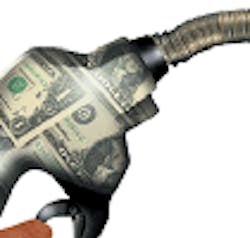With fuel prices likely to stay both high and volatile over the long term, trucking companies are redoubling efforts to understand and manage fuel costs, according to a spokesperson for Transmontaigne, a fuel asset-management firm.
“[The fuel pricing issue] has broken the upper tiers of various segments-- the truckload carriers and commercial fleets-- out of the old ways into more of mastery of the supply chain,” Rick Eaton, senior vp of marketing and logistics for Transmontaigne, told Fleet Owner.
“Commercial and private fleets are very budget-conscious of the overall volatility of fuel prices,” Eaton explained. “It’s not just the higher prices, but the big ups and downs that create a concern. We are seeing independent private fleets become much more cognizant about instituting programs that manage exposure to these volatilities. They are very proactive in terms of bulk fuel, retail and mobile fuel purchases.”
Eaton advocates hedging to some extent to minimize the risks associated with day-by-day swings. However, different budgetary priorities among carriers— particularly between for-hire fleets and private fleets— generate too many complexities to suggest a “silver-bullet” solution.
“Hedging has in general been a more desirable option,” said Eaton. “But used in conjunction with the day-to-day volatilities, it helps manage your absolute level. It is rare to hedge 100%. When carriers lock in fuel prices, from a budget standpoint they have no exposure to volatility. Others may have different pricing concepts in terms of caps.”
In an earlier interview, truckload carrier Contract Freighters Inc. (CFI) president Herb Schmidt told Fleet Owner that a diversified customer base, coupled with variable weekly fuel charges has eliminated nearly all profit losses associated with volatility.
See Passing through diesel prices.
Eaton cautions about the disadvantages of a day-to-day purchase plan, however.
“Remember that with volatile diesel prices, paying as you go becomes important the day you decide to order the fuel,” he said. “A fuel surcharge can no longer protect you from all of the exposure and risk that you’re going to incur.”
While the “silver bullet” of fuel purchasing strategies may remain elusive, it is becoming more apparent with fewer refineries, low sulfur diesel, renewable and surging world demand, high and volatile prices may be here to stay, Eaton pointed out.
